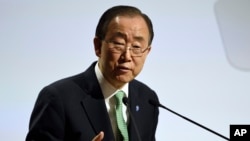The United Nations Security Council on Monday condemned the storming of Saudi Arabia's embassy in the Iranian capital, which happened Saturday after Riyadh carried out the death penalty against a prominent Shi'ite cleric.
A council statement called on Iran to respect its international obligations to protect diplomatic property and urged all parties to "maintain dialogue and take steps to reduce tensions in the region."
In a letter earlier Monday to U.N. Secretary-General Ban Ki-moon, as well as to the presidents of the U.N. Security Council and the General Assembly, Saudi Arabia’s U.N. Ambassador Abdallah al-Mouallimi strongly condemned the invasion of its Tehran embassy and damage to its consulate in the Iranian city of Mashhad.
“We call upon the Security Council to take all appropriate measures to ensure the inviolability of diplomatic facilities and the protection of all Saudi diplomats in Iran,” al-Mouallimi wrote.
He said Riyadh is “appalled” at the failure of Iranian authorities to prevent the attacks. Under the 1961 Vienna Convention on Consular Relations, host countries are required to take necessary steps to protect diplomatic and consular premises and staff.
In its own letter to the U.N. chief, Iranian envoy Gholamali Khoshroo acknowledged that “around 8,000” protesters staged a peaceful demonstration that got “out of control,” despite “extensive efforts” by police. He said more than 40 protesters were arrested and an investigation to find other perpetrators is under way.
The protesters were angry at the execution of Shi’ite cleric Nimr al-Nimr. The Saudi government announced his execution on January 2, along with 46 other prisoners on terrorism related charges. Nimr was an outspoken critic of the Saudi monarchy.
The Iranian ambassador called the cleric’s execution by beheading “unjustified and provocative.”
Regional Consequences
Secretary-General Ban expressed concern at the escalation in tensions between the two regional powers, urging them to avoid actions that could exacerbate the situation bilaterally and in the region as a whole. He added that the announcement of a break in Saudi diplomatic relations with Tehran is “deeply worrying.”
Bahrain and Sudan also said they are cutting their diplomatic ties with Tehran, while the United Arab Emirates downgraded its relations with Iran.
“This escalation is likely to have regional consequences in Syria, Iraq, Yemen and beyond,” said George Washington University international affairs professor Edmund Ghareeb. He warned it could hurt efforts to push the fledgling peace process forward in Syria. The U.N. hopes to hold the first round of intra-Syrian talks on January 25.
“This escalation is likely to complicate the efforts of the United Nations, Russia and the United States to bring the parties together,” Ghareeb added.
“We are concerned it could escalate and could derail the Syria talks; it could derail the Yemen talks; it could potentially become a much bigger problem,” Britain’s U.N. ambassador Matthew Rycroft told reporters. He said he hopes the Security Council will do its part to manage the “tension and to seek de-escalation.”
The secretary-general spoke Sunday with Iranian Foreign Minister Mohammad Javad Zarif and on Monday with Saudi Foreign Minister Adel Al-Jubeir in a bid to calm the situation.
The U.N. said Ban expressed his condemnation to Zarif of the attack at the Saudi embassy in Tehran and urged the foreign minister to take the necessary measures to protect diplomatic facilities in the country. He also reiterated his deep dismay at the execution of Sheikh Nimr and the 46 other prisoners.
Death Penalty
In his call with the Saudi foreign minister, the U.N. said the secretary-general “reiterated his views on capital punishment and his disappointment over the execution of Sheikh al-Nimr, whose case he had raised with the Saudi authorities on several occasions.”
The secretary-general has previously said the death penalty “has no place in the 21st century,” and has urged a worldwide moratorium on its use.
In a statement Saturday about the mass executions, Ban expressed concern that they were carried out “following trials that raised serious concerns over the nature of the charges and the fairness of the process.”
Saudi Arabia rejected that criticism, saying in a statement from its U.N. mission that all of those convicted had fair and public trials and the right to appeal.
"He was very much misinformed,” the Saudi ambassador told reporters about the secretary-general. “The allegations that the trial and the procedures were somehow tainted is simply misinformed,” he added.
UN Envoy to Riyadh
The U.N. Special Envoy for Syria, Staffan de Mistura, arrived in Riyadh Monday to meet with officials. He said this is a “very worrisome development” and he will assess the implications of it on the Syria peace process. He will visit Tehran later this week.
The U.N.’s Special Envoy for Yemen, Ismail Ould Cheikh Ahmed, also is due in the region Wednesday to try to secure a new cease-fire after the Saudis ended a shaky one put in place on December 15 that coincided with peace talks in Geneva. Both sides repeatedly violated that truce.













